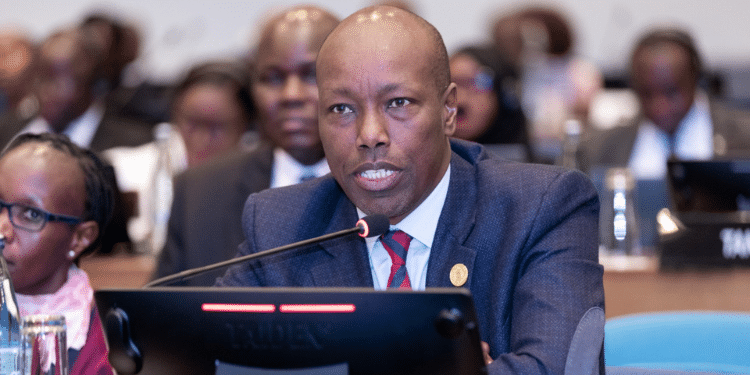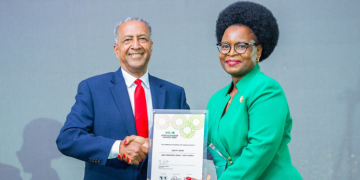Every child has a right to education, yet for millions across Africa, an empty stomach stands in the way of learning. Hunger is one of the most persistent educational barriers, affecting school attendance, concentration, retention, and academic performance. For many children, a daily school meal is a source of nourishment and a reason to attend school and stay focused in class.
Data from the 2024 African Pulse Report shows that extreme hunger in sub-Saharan Africa resulted in 90 per cent of 10-year-olds in the region being unable to read simple text. The food crisis, according to researchers, is largely brought about by extreme weather events that have disproportionately affected the African continent in recent years and are expected to continue as global climate change worsens.
Proper nutrition is essential for brain development and cognitive function, directly impacting a child’s learning ability. Every year on March 1, Africa observes the African Day for School Feeding, a day to highlight the power of school meals in combating malnutrition, enhancing learning, and addressing food insecurity. School feeding programs ensure that students receive adequate nutrients, improving their memory, focus, and overall academic performance. Well-nourished students will likely excel in literacy and numeracy, laying a strong foundation for lifelong learning.
Progress in Africa
Across the sub-Saharan Africa region, several countries have made commendable progress in achieving a significant milestone in school enrolment, particularly in primary education.
Also Read: Win for Sakaja as Court Rules on School Feeding Program
This is despite the prevalent education inequality on the continent, primarily determined by poverty.
Additionally, while the global figure of stunting decreased from 33% to 22.3% in 2022 in the space of 23 years, malnutrition is still on the high side in Africa due to the prevalence of poverty in the region.
Many African school feeding initiatives prioritize homegrown food procurement to address malnutrition, linking local farmers to schools.
This approach provides fresh, nutritious meals and supports smallholder farmers, creating economic opportunities within communities.
Strengthening the connection between schools and local agriculture fosters food security and promotes sustainable development.
School Feeding program
In Kenya, school feeding programs started in the 1980s and have played a role in improving literacy, promoting gender equality, and strengthening local economies.
The government and partners provide daily meals to children in food-insecure regions, significantly reducing malnutrition rates and boosting school retention.
School feeding programs strongly incentivize parents to enroll and keep their children in school, particularly in vulnerable communities with high food insecurity.
When children are assured of at least one nutritious meal daily, they are more likely to attend school consistently, reducing dropout rates and increasing overall enrollment.
Promoting Equality
In addition, in many societies, girls face a higher risk of being withdrawn from school due to household responsibilities or early marriages. School feeding programs incentivize parents to educate their daughters, as they assure daily meals.
This intervention has been instrumental in narrowing the gender gap in education, empowering girls to complete their schooling and pursue their dreams. Countries across Africa have demonstrated the transformative power of school feeding programs.
Also Read: Explained: Benefits of Fortified Meals and Why they Are Cost Effective
For example, Ghana’s Home-Grown School Feeding Program (HGSFP) has reached over 3 million children, improved attendance and supporting thousands of local farmers.
While school feeding programs have made significant strides in Kenya, much work remains.
For instance, the government-funded school feeding programme known as Dishi na County is only implemented in public primary schools, leaving private schools, secondary schools, and community-based schools unreached in urban informal settings.
Other programs are only available to schools in arid and semi-arid regions by the government body NACONEK, which leaves schools in different areas equally vulnerable to food insecurity.
To ensure every child benefits, a collaborative effort among governments, development partners, and communities is essential to reach more learners and advance the goal of universal education.
Sustainable initiatives
At the government level, increasing funding for school feeding programs is critical to ensure every child gets to enjoy a meal in school.
Additionally, homegrown school feeding should be encouraged as it provides a sustainable way of ensuring that the school children are fed while empowering the local communities economically, which will also ensure the children are fed at the household level.
“Give a man a fish and you feed him for a day. Teach a man to fish and you feed him for a lifetime.” African Proverb.
As the African proverb suggests, this philosophy underscores the importance of capacity building farmers for sustainable farming. Involving them in school meals provision is a sure way of ensuring sustainability.
As we celebrate this year’s African Day for School Feeding, we must recognize that feeding children in school is not just about food, it is about education, health, and economic empowerment.
Investing in school meals means investing in Africa’s future. By nourishing young minds today, we are paving the way for a generation of well-educated, healthy, and empowered individuals who will develop the continent.
No child should go hungry simply because they cannot afford a meal. Ensuring access to nutritious, dignified school lunches is not just a policy issue, it’s a moral imperative and no child has to choose between hunger and education.
About the Authors
This article was jointly authored by Davis Muli Musyoki, William Mawia, Felistus Mwalia, and Alice Ritho.
Davis is a Communications Officer in the Synergy Unit within the Policy Engagement and Communications (PEC) division at the African Population and Health Research Center. APHRC
William is a Communications Manager in the Visibility Unit under the Policy Engagement and Communications (PEC) division at the APHRC.
Felistus is a Communications Officer assigned to the Nutrition and Food Systems (NFS) Unit.
Alice is a Research Officer in the Nutrition and Food Systems Unit at APHRC.
Follow our WhatsApp Channel and join our WhatsApp Group for real-time news updates.









![Billionaire Richard Branson Invites Guests For Ksh256,000 Hike, Breakfast In Kenya [Full Package] Luxury Getaway Establishment By Finch Hattons Photo/Finch Hattons](https://thekenyatimescdn-ese7d3e7ghdnbfa9.z01.azurefd.net/prodimages/uploads/2024/05/Tsavo-3.jpg)


































































